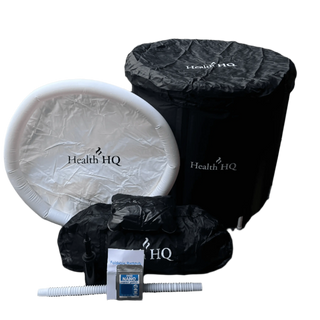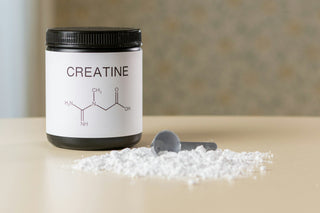The Benefits of Mouth Taping for Better Sleep: What You Need to Know
At HealthHQ, we're always looking for simple yet effective ways to improve overall health and well-being. One trending practice that has gained attention for enhancing sleep quality is mouth taping. Although it may seem unusual at first, mouth taping offers significant benefits, particularly for those who struggle with snoring, dry mouth, or poor sleep.
In this article, we'll dive into the practice of taping your mouth while sleeping, why it's beneficial, and how you can safely incorporate it into your nighttime routine.
What Is Mouth Taping?
Mouth taping is exactly what it sounds like—applying a specially designed tape over your mouth while you sleep. The goal is to promote nose breathing throughout the night, which can provide a range of health benefits. People who breathe through their mouths during sleep are more likely to experience snoring, interrupted sleep, and other issues.
At HealthHQ, we offer products like the Eelhoe Elevate + Mouth Tape or the Elaimei Mouth Tape Sleep Strips, specifically designed to keep your mouth gently closed, encouraging nasal breathing while still allowing for comfortable, restful sleep.
Why Should You Tape Your Mouth While Sleeping?
Here are some of the primary benefits associated with mouth taping:
- Improves Sleep Quality
Breathing through your nose is more efficient than mouth breathing, as it helps regulate the amount of oxygen entering your lungs. Nasal breathing also allows the body to filter, humidify, and warm the air before it enters the lungs, which can improve respiratory efficiency and overall sleep quality.
- Reduces Snoring
One of the most common causes of snoring is mouth breathing. Taping your mouth can help prevent this, as it encourages nasal breathing, which is less likely to cause the airway vibrations responsible for snoring. This is particularly helpful for individuals or their partners who struggle with snoring disruptions.
- Prevents Dry Mouth and Throat
Mouth breathing tends to dry out the mouth and throat, leading to discomfort and even oral health issues. By keeping your mouth closed with tape, you can maintain moisture in your mouth and throat, reducing the likelihood of dry mouth symptoms.
- Supports Better Oral Health
Mouth breathing can lead to a range of oral health issues, including tooth decay, gum disease, and bad breath. Nasal breathing promotes a more balanced environment in your mouth, reducing the risk of bacteria buildup and other oral health concerns.
- Helps Regulate Carbon Dioxide Levels
Nasal breathing naturally helps the body maintain the right balance of carbon dioxide, which is essential for optimal oxygen absorption. When we mouth-breathe, we tend to lose more carbon dioxide, leading to less efficient oxygen delivery to the body’s tissues. Mouth taping supports better CO2 retention, which can enhance overall health.
Who Should Try Mouth Taping?
Mouth taping can be beneficial for a variety of individuals, including those who:
- Snore: If you or your partner snores due to mouth breathing, mouth taping could help alleviate the problem.
- Wake up with dry mouth: People who frequently wake up with a dry mouth or sore throat might benefit from nose breathing at night.
- Want to improve sleep quality: If you're looking for a simple way to promote better sleep, taping your mouth could lead to deeper, more restful sleep.
- Suffer from mild sleep apnea: Although it’s not a cure for sleep apnea, mouth taping can sometimes help those with mild forms of the condition breathe more easily during sleep.
Is Mouth Taping Safe?
Mouth taping is generally safe for most people, but it’s important to use products specifically designed for the task. Regular tapes can be too harsh on the skin or may not allow for the flexibility needed for safe breathing.
Aim for a product which is gentle, skin-friendly, and easy to use, designed to keep the mouth closed without discomfort, ensuring a safe and restful sleep experience.
If you have any pre-existing respiratory conditions, such as asthma or sleep apnea, it's always best to consult a healthcare provider before trying mouth taping.
How to Start Mouth Taping
If you’re ready to try mouth taping, here’s a simple guide to get started:
- Choose the Right Tape: Use a dedicated mouth tape like the Eelhoe Elevate + Mouth Tape or the Elaimei Mouth Tape Sleep Strips which are designed to be comfortable and gentle on your skin.
- Clean and Dry Your Mouth Area: Ensure your lips and surrounding skin are clean and dry to help the tape adhere securely.
- Apply the Tape: Place the tape horizontally across the centre of your lips. It should feel comfortable and not restrict your breathing.
- Test It First: If you’re new to mouth taping, you might want to try it for a short nap or during the day to get used to the sensation.
- Monitor Your Sleep: After your first night, note any changes in your sleep quality, breathing, or energy levels during the day.
Final Thoughts on Mouth Taping
Mouth taping is a simple yet effective way to improve your sleep quality and overall health. By encouraging nasal breathing, this practice can reduce snoring, alleviate dry mouth, and promote better sleep.
Read More:
- Healthline: The Benefits of Nasal Breathing
- Sleep Foundation: How Mouth Breathing Affects Sleep
- NCBI: The Impact of Mouth Breathing on Oral Health
- Sleep Advisor: Mouth Taping for Better Sleep








